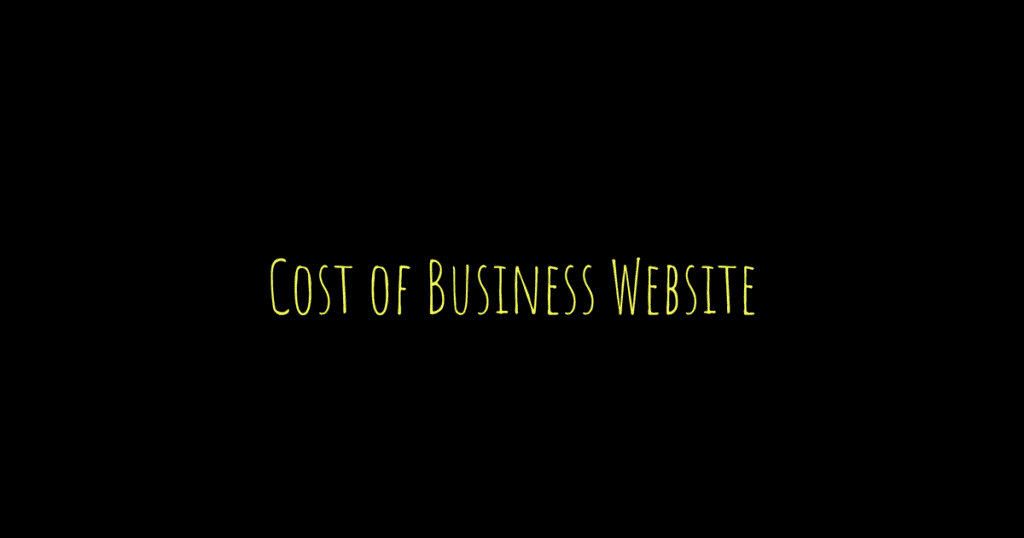Creating a business website can come with various costs that add up quickly. First, you’ll need to purchase a domain name, which usually ranges from $0.99 to $60 per year. Website hosting is another expense; shared hosting may cost around $3 to $10 monthly, while dedicated options could hit $80 to $300 monthly. Additionally, an SSL certificate for security adds another layer of cost at about $10 to $300 annually. Design and development can vary widely: DIY tools start around $37 per month, while hiring agencies typically runs between $2,000 and over $10,000 for custom sites. Moreover, ongoing maintenance and content creation should also be factored in for comprehensive budgeting.
1. Domain Name Costs

When creating a business website, one of the first costs you’ll encounter is the domain name. This is your website’s address on the internet, like www.yourbusiness.com. The average cost for registering a domain name ranges from $0.99 to $60 per year. However, the registration or renewal price can vary based on the domain provider and the popularity of the desired name. Generally, you can expect renewal costs to fall between $10 and $60 annually.
It’s important to choose a domain that reflects your business and is easy for customers to remember. Sometimes, premium domain names that are highly sought after can cost significantly more than the average range. For example, if you are looking for a trendy or common keyword, you might find yourself paying hundreds or even thousands of dollars for that domain. Additionally, keep in mind that some providers offer discounts for the first year, so it’s wise to compare prices when selecting a registrar. Investing in a good domain name is crucial, as it helps establish your brand’s identity and credibility online.
2. Website Hosting Costs
Website hosting costs are an essential part of maintaining an online presence for your business. There are different types of hosting options depending on your needs and budget. Shared hosting, which is suitable for low to moderate traffic, typically costs between $3 and $10 per month. This option is great for startups or small businesses that are just getting started. If your website experiences medium traffic, you might consider VPS (Virtual Private Server) hosting, which ranges from $20 to $60 per month. This type of hosting provides more resources and better performance compared to shared hosting. For high-traffic websites, dedicated hosting is the best choice, with costs ranging from $80 to $300 per month. This option provides an entire server solely for your website, ensuring optimal speed and reliability. Additionally, some hosting providers offer bundled services, including domain registration and SSL certificates, which can save you time and potentially money. It’s crucial to assess your business’s specific needs to choose the most appropriate hosting option, as this decision can impact your website’s performance and user experience.
3. SSL Certificate Expenses
An SSL (Secure Sockets Layer) certificate is crucial for securing the data exchanged between your website and its visitors. It encrypts sensitive information, such as credit card numbers and personal details, protecting them from potential breaches. The cost of an SSL certificate can vary based on the type you choose. A standard SSL certificate typically ranges from $10 to $100 annually, which is sufficient for most small to medium-sized businesses. However, if your website requires a higher level of security, such as for e-commerce sites or organizations handling sensitive information, you might consider an Extended Validation (EV) SSL certificate, which can cost between $100 and $300 per year. This type of certificate provides an added layer of trust, displaying a green address bar in browsers, which can enhance customer confidence. Investing in an SSL certificate is not just about compliance; it’s also a key factor in building trust with your audience.
4. Website Design and Development Costs
Website design and development costs can vary greatly depending on the approach you choose. If you opt for a DIY website builder like Leadpages, you might pay around $37 per month. This is a good option for those with limited budgets or simpler needs. However, if you decide to hire a professional web design agency, expect to pay between $2,000 and $5,000 for a basic website. Custom builds can easily exceed $10,000, especially if you need unique features or complex designs.
The cost can also increase based on the functionalities you want. For instance, adding e-commerce capabilities or advanced features might range from $5,000 to $10,000. If you’re looking to integrate a Content Management System (CMS) for easier content updates, that can set you back another $3,000 to $10,000 depending on how customized you want it to be.
Additionally, the number of pages on your site matters. A basic site with 1-75 pages can cost anywhere from $1,000 to $3,000, but if your site has many pages or requires more complex layouts, costs can soar to $10,000 or more.
Maintaining your website is also crucial. Regular updates and security maintenance will likely cost between $50 and $200 per month, and backup solutions can add another $5 to $50 monthly depending on your needs.
5. Additional Development Costs
When considering the additional development costs for creating a business website, it’s important to factor in specific features that may enhance your site’s functionality. For instance, adding e-commerce capabilities can significantly increase costs, typically ranging from $5,000 to $10,000. This includes setting up an online store, payment gateways, and inventory management systems.
Another key consideration is the integration of a Content Management System (CMS). Depending on the level of customization required, integrating a CMS can cost between $3,000 and $10,000. This allows for easier content updates and management, which is crucial for businesses that require frequent changes to their website.
Moreover, the complexity and number of features you choose can also dictate the overall development costs. For example, if you require advanced functionalities like user accounts, membership systems, or custom plugins, the expenses can escalate quickly. It’s essential to evaluate your needs carefully and prioritize features that align with your business goals to manage these costs effectively.
6. Costs Based on Number of Pages
The cost of creating a business website can vary significantly based on the number of pages included. For a basic site consisting of 1 to 75 pages, businesses can expect to pay between $1,000 and $3,000. This price range generally covers essential pages such as Home, About Us, Services, and Contact. However, as the number of pages increases, especially for larger sites with more complex structures and functionalities, costs can rise dramatically. For instance, a website with over 100 pages might easily push expenses beyond $10,000. This increase is often due to additional design work, content creation, and potential custom development required for navigation and user experience. Therefore, businesses should carefully consider their content needs and growth plans when budgeting for their website.
7. Website Maintenance Costs
Website maintenance is a crucial aspect of managing a business website, often overlooked in initial budgeting. Regular updates and security patches are essential to protect your site from vulnerabilities and ensure smooth operation, costing between $50 and $200 per month. Additionally, backup solutions are necessary to safeguard your data, with prices ranging from $5 to $50 monthly, depending on how frequently backups are performed and the storage capacity needed. For instance, a small business might opt for a basic maintenance package at $100 per month, which includes updates and weekly backups. As your site grows, these maintenance costs can increase, particularly if you add more features or pages that require ongoing support. Ignoring these costs can lead to larger issues down the line, potentially resulting in expensive repairs or loss of data.
8. Content Creation Costs
Creating content for your business website is a crucial aspect that can significantly influence your overall budget. The costs can vary widely depending on whether you choose to create the content yourself or hire professionals. If you opt for DIY content, it can save you money, but you may sacrifice quality, which is essential for engaging your audience effectively. On the other hand, hiring freelance writers or content agencies can range from $50 to $500 per article or page, depending on the complexity and depth of the content. For instance, a blog post that requires extensive research may cost more than a simple product description. Additionally, consider the ongoing need for fresh content, as regularly updating your site with new articles, blogs, or product descriptions can keep your audience engaged and improve your SEO rankings. Therefore, allocating a budget for content creation is vital, and businesses should plan for both initial content as well as ongoing updates.
9. SEO and Marketing Costs
SEO and marketing costs are crucial for driving traffic to your website and improving its visibility on search engines. Investing in SEO services can range significantly, often falling between $500 to $5,000 per month, depending on the complexity of your needs and the agency you choose. Basic SEO services might include keyword research, on-page optimization, and link building, while more comprehensive packages could involve content marketing, social media management, and ongoing performance analysis.
For instance, a small business might spend around $1,000 on initial SEO setup, which includes optimizing existing content and building backlinks. However, to maintain a competitive edge, continuous investment is necessary. This could mean spending an additional $500 to $1,500 monthly for ongoing SEO efforts.
In addition to SEO, marketing costs can vary based on the channels you choose. Social media advertising, Google Ads, and email marketing campaigns can all contribute to your overall marketing budget. For example, a small pay-per-click (PPC) campaign may start at $300 to $1,000 monthly, depending on the competitiveness of your industry and the targeted keywords.
Ultimately, while these costs may seem high, they are essential for attracting visitors, converting leads, and ensuring long-term growth for your business website.
10. Overall Estimated Costs
The overall estimated costs for creating a business website can vary significantly based on the complexity and functionality required. For a basic website, you might spend anywhere from $100 to $500 for very simple setups that include essential features. However, for small business websites with standard functionalities, the costs typically range from $1,000 to $5,000. If you’re looking for more advanced websites that include custom development or intricate features, expect to invest between $500 and $30,000 or more. For example, an e-commerce site with multiple product pages and advanced features could easily push costs towards the higher end of this spectrum. Understanding these potential costs helps businesses allocate their budgets effectively and avoid unexpected expenses.
| Website Type | Cost Range |
|---|---|
| Basic Website | $100 – $500 |
| Small Business Website | $1,000 – $5,000 |
| Advanced Website | $500 – $30,000+ |
11. Cost-Saving Tips
To save costs when creating a business website, consider starting with a simpler version. This approach allows you to build a basic site that meets your essential needs, and you can expand and enhance it as your business grows. Another way to cut costs is to use free themes and plugins available from various platforms. Many of these options provide solid functionality and aesthetics without the need for a hefty price tag. As your website evolves, you can invest in premium themes or plugins for added features. It’s also crucial to regularly review your budget and spending on website-related expenses. This practice helps identify areas where you might be overspending, allowing you to make necessary adjustments and avoid unnecessary costs. For example, if you find that your hosting plan exceeds your needs, switching to a more suitable plan could save you money. Lastly, consider leveraging DIY content creation tools when possible. While hiring professionals can ensure high-quality content, learning to create some content yourself can significantly reduce expenses.
- Consider using a website builder instead of hiring a developer.
- Look for discounts on domain names during promotions or offer periods.
- Utilize free or low-cost hosting services for startups.
- Opt for open-source content management systems like WordPress.
- Take advantage of template designs rather than custom designs.
- Regularly review and adjust your hosting plan as your traffic changes.
- Limit the number of pages to essential information only.
12. Choosing Between Builders and Agencies
When deciding how to create your business website, you have two main options: website builders and web design agencies. Website builders, like Wix or Squarespace, are often more cost-effective for straightforward needs. They provide templates and easy drag-and-drop features, making them ideal for those who want to create a simple site quickly and without technical expertise. This option typically costs between $10 to $50 per month, depending on the features you choose.
On the other hand, web design agencies offer tailored solutions and professional expertise, which can be invaluable for businesses with specific requirements or those looking for a unique design. While the cost is higher—often ranging from $2,000 to $10,000 for a basic site—agencies can provide custom development, advanced features, and ongoing support. For example, if your business needs e-commerce capabilities or a complex content management system, an agency can deliver a solution that fits your needs perfectly.
In summary, if you’re on a tight budget and need a simple website, a builder might be the right choice. However, if you require a personalized approach with advanced functionalities, investing in an agency could be worthwhile.
Frequently Asked Questions
1. What steps are involved in building a business website?
Building a business website usually involves planning the site structure, designing the layout, developing the actual site using coding or website builders, testing for issues, and then launching it to the public.
2. What skills do I need to create a business website?
To create a business website, you’ll need some skills in web design, coding, content creation, and basic SEO to help your site be found by search engines.
3. Why is it important to choose the right platform for my website?
Choosing the right platform is important because it affects how easy it is to build, maintain, and update your website, along with its performance and functionality.
4. How do I know if my website is effective?
You can tell if your website is effective by looking at its traffic, how long visitors stay on it, and whether they’re taking actions you want them to, like signing up or making a purchase.
5. What are common features I should include on my business website?
Common features to include are a homepage, about page, services or products page, contact form, blog, and customer testimonials to help engage and inform visitors.
TL;DR Creating a business website involves various costs: domain names average $0.99 to $60 yearly, hosting ranges from $3 to $300 monthly, SSL certificates cost $10 to $300 annually, and design/development can start at $2,000 for basic sites. Expect additional costs for advanced features, maintenance ($50 to $200 monthly), content creation, and SEO. Overall, simple sites range from $100 to $5,000, while more advanced options can exceed $30,000. Consider using website builders for cost savings or hiring agencies for customized solutions.



